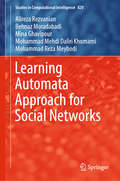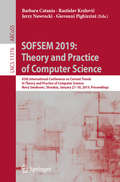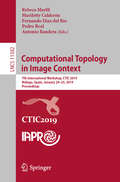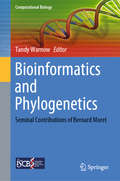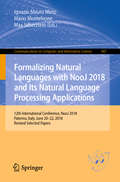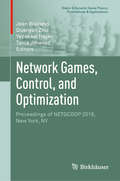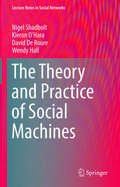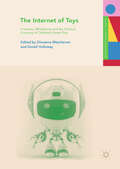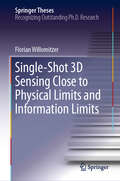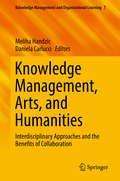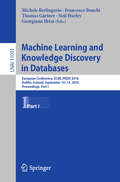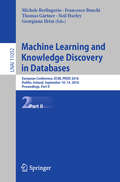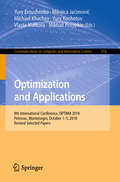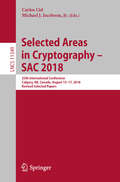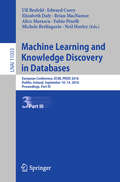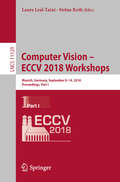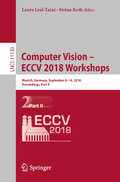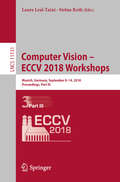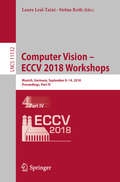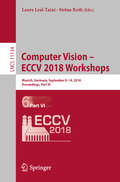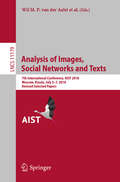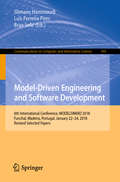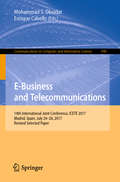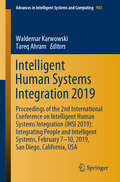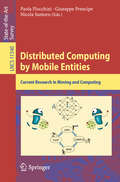- Table View
- List View
Learning Automata Approach for Social Networks (Studies in Computational Intelligence #820)
by Alireza Rezvanian Behnaz Moradabadi Mina Ghavipour Mohammad Mehdi Daliri Khomami Mohammad Reza MeybodiThis book begins by briefly explaining learning automata (LA) models and a recently developed cellular learning automaton (CLA) named wavefront CLA. Analyzing social networks is increasingly important, so as to identify behavioral patterns in interactions among individuals and in the networks’ evolution, and to develop the algorithms required for meaningful analysis. As an emerging artificial intelligence research area, learning automata (LA) has already had a significant impact in many areas of social networks. Here, the research areas related to learning and social networks are addressed from bibliometric and network analysis perspectives. In turn, the second part of the book highlights a range of LA-based applications addressing social network problems, from network sampling, community detection, link prediction, and trust management, to recommender systems and finally influence maximization. Given its scope, the book offers a valuable guide for all researchers whose work involves reinforcement learning, social networks and/or artificial intelligence.
SOFSEM 2019: 45th International Conference on Current Trends in Theory and Practice of Computer Science, Nový Smokovec, Slovakia, January 27-30, 2019, Proceedings (Lecture Notes in Computer Science #11376)
by Barbara Catania Rastislav Královič Jerzy Nawrocki Giovanni PighizziniThis book constitutes the refereed proceedings of the 45th International Conference on Current Trends in Theory and Practice of Computer Science, SOFSEM 2019, held in Nový Smokovec, Slovakia, in January 2019. The 34 full papers presented together with 6 invited talks were carefully reviewed and selected from 92 submissions. They presented new research results in the theory and practice of computer science in the each sub-area of SOFSEM 2019: Foundations of theoretical Computer Science, foundations of data science and engineering, and foundations of software engineering.
Computational Topology in Image Context: 7th International Workshop, CTIC 2019, Málaga, Spain, January 24-25, 2019, Proceedings (Lecture Notes in Computer Science #11382)
by Rebeca Marfil Mariletty Calderón Fernando Díaz del Río Pedro Real Antonio BanderaThis book constitutes the proceedings of the 7th International Workshop on Computational Topology in Image Context, CTIC 2019, held in Málaga, Spain, in January 2019. The 14 papers presented in this volume were carefully reviewed and selected from 21 submissions. Papers deal with theoretical issues but most of them put the attention on the applicability of concepts and algorithms. These were designed to deal with objects and images, but also with the speech signal. The final application must be for instance in the medical domain or in the robotics one.
Bioinformatics and Phylogenetics: Seminal Contributions of Bernard Moret (Computational Biology #29)
by Tandy WarnowThis volume presents a compelling collection of state-of-the-art work in algorithmic computational biology, honoring the legacy of Professor Bernard M.E. Moret in this field. Reflecting the wide-ranging influences of Prof. Moret’s research, the coverage encompasses such areas as phylogenetic tree and network estimation, genome rearrangements, cancer phylogeny, species trees, divide-and-conquer strategies, and integer linear programming. Each self-contained chapter provides an introduction to a cutting-edge problem of particular computational and mathematical interest.Topics and features: addresses the challenges in developing accurate and efficient software for the NP-hard maximum likelihood phylogeny estimation problem; describes the inference of species trees, covering strategies to scale phylogeny estimation methods to large datasets, and the construction of taxonomic supertrees; discusses the inference of ultrametric distances from additive distance matrices, and the inference of ancestral genomes under genome rearrangement events; reviews different techniques for inferring evolutionary histories in cancer, from the use of chromosomal rearrangements to tumor phylogenetics approaches; examines problems in phylogenetic networks, including questions relating to discrete mathematics, and issues of statistical estimation; highlights how evolution can provide a framework within which to understand comparative and functional genomics; provides an introduction to Integer Linear Programming and its use in computational biology, including its use for solving the Traveling Salesman Problem.Offering an invaluable source of insights for computer scientists, applied mathematicians, and statisticians, this illuminating volume will also prove useful for graduate courses on computational biology and bioinformatics.
Formalizing Natural Languages with NooJ 2018 and Its Natural Language Processing Applications: 12th International Conference, NooJ 2018, Palermo, Italy, June 20–22, 2018, Revised Selected Papers (Communications in Computer and Information Science #987)
by Max Silberztein Mario Monteleone Ignazio Mauro MirtoThis book constitutes the refereed proceedings of the 12th International Conference, NooJ 2018, held in Palermo, Italy, in June 2018. The 17 revised full papers and 3 short papers presented in this volume were carefully reviewed and selected from 48 submissions. NooJ is a linguistic development environment that provides tools for linguists to construct linguistic resources that formalize a large gamut of linguistic phenomena: typography, orthography, lexicons for simple words, multiword units and discontinuous expressions, inflectional and derivational morphology, local, structural and transformational syntax, and semantics. The papers in this volume are organized in topical sections on vocabulary and morphology; syntax and semantics; and natural language processing applications.
Network Games, Control, and Optimization: Proceedings Of Netgcoop 2016, Avignon, France (Static & Dynamic Game Theory: Foundations & Applications)
by Jean Walrand Quanyan Zhu Yezekael Hayel Tania JimenezThis contributed volume offers a collection of papers presented at the 2016 Network Games, Control, and Optimization conference (NETGCOOP), held at the University of Avignon in France, November 23-25, 2016. These papers highlight the increasing importance of network control and optimization in many networking application domains, such as mobile and fixed access networks, computer networks, social networks, transportation networks, and, more recently, electricity grids and biological networks. Covering a wide variety of both theoretical and applied topics in the areas listed above, the authors explore several conceptual and algorithmic tools that are needed for efficient and robust control operation, performance optimization, and better understanding the relationships between entities that may be acting cooperatively or selfishly in uncertain and possibly adversarial environments. As such, this volume will be of interest to applied mathematicians, computer scientists, engineers, and researchers in other related fields.
The Theory and Practice of Social Machines (Lecture Notes in Social Networks)
by Nigel Shadbolt Kieron O’Hara David De Roure Wendy HallSocial machines are a type of network connected by interactive digital devices made possible by the ubiquitous adoption of technologies such as the Internet, the smartphone, social media and the read/write World Wide Web, connecting people at scale to document situations, cooperate on tasks, exchange information, or even simply to play. Existing social processes may be scaled up, and new social processes enabled, to solve problems, augment reality, create new sources of value, and disrupt existing practice.This book considers what talents one would need to understand or build a social machine, describes the state of the art, and speculates on the future, from the perspective of the EPSRC project SOCIAM – The Theory and Practice of Social Machines. The aim is to develop a set of tools and techniques for investigating, constructing and facilitating social machines, to enable us to narrow down pragmatically what is becoming a wide space, by asking ‘when will it be valuable to use these methods on a sociotechnical system?’ The systems for which the use of these methods adds value are social machines in which there is rich person-to-person communication, and where a large proportion of the machine’s behaviour is constituted by human interaction.
The Internet of Toys: Practices, Affordances and the Political Economy of Children’s Smart Play (Studies in Childhood and Youth)
by Giovanna Mascheroni Donell HollowayThe Internet of Toys (IoToys) is a developing market within our Internet of Things (IoT) ecosystem. This book examines the rise of internet-connected toys and aims to anticipate the opportunities and risks of IoToys before their widespread diffusion. Contributors to this volume each provide a critical analysis of the design, production, regulation, representation and consumption of internet-connected toys. In order to address the theoretical, methodological and policy questions that arise from the study of these new playthings, and contextualise the diverse opportunities and challenges that IoToys pose to educators, families and children themselves, the chapters engage with notions of mediatization, datafication, robotification, connected and post-digital play. This timely engagement with a key transformation in children’s play will appeal to all readers interested in understanding the social uses and consequences of IoToys, and primarily to researchers and students in children and media, early childhood studies, media and communications, sociology, education, social psychology, law and design.
Single-Shot 3D Sensing Close to Physical Limits and Information Limits (Springer Theses)
by Florian WillomitzerThis thesis discusses the physical and information theoretical limits of optical 3D metrology, and, based on these principal considerations, introduces a novel single-shot 3D video camera that works close to these limits. There are serious obstacles for a “perfect” 3D-camera: The author explains that it is impossible to achieve a data density better than one third of the available video pixels. Available single-shot 3D cameras yet display much lower data density, because there is one more obstacle: The object surface must be “encoded” in a non-ambiguous way, commonly by projecting sophisticated patterns. However, encoding devours space-bandwidth and reduces the output data density. The dissertation explains how this profound dilemma of 3D metrology can be solved, exploiting just two synchronized video cameras and a static projection pattern.The introduced single-shot 3D video camera, designed for macroscopic live scenes, displays an unprecedented quality and density of the 3D point cloud. The lateral resolution and depth precision are limited only by physics. Like a hologram, each movie-frame encompasses the full 3D information about the object surface and the observation perspective can be varied while watching the 3D movie.
Knowledge Management, Arts, and Humanities: Interdisciplinary Approaches and the Benefits of Collaboration (Knowledge Management and Organizational Learning #7)
by Meliha Handzic Daniela CarlucciThis book presents a series of studies that demonstrate the value of interactions between knowledge management with the arts and humanities. The carefully compiled chapters show, on the one hand, how traditional methods from the arts and humanities – e.g. theatrical improvisation, clay modelling, theory of aesthetics – can be used to enhance knowledge creation and evolution. On the other, the chapters discuss knowledge management models and practices such as virtual knowledge space (BA) design, social networking and knowledge sharing, data mining and knowledge discovery tools. The book also demonstrates how these practices can yield valuable benefits in terms of organizing and analyzing big arts and humanities data in a digital environment.
Machine Learning and Knowledge Discovery in Databases: European Conference, ECML PKDD 2018, Dublin, Ireland, September 10–14, 2018, Proceedings, Part I (Lecture Notes in Computer Science #11051)
by Michele Berlingerio Francesco Bonchi Thomas Gärtner Neil Hurley Georgiana IfrimThe three volume proceedings LNAI 11051 – 11053 constitutes the refereed proceedings of the European Conference on Machine Learning and Knowledge Discovery in Databases, ECML PKDD 2018, held in Dublin, Ireland, in September 2018. The total of 131 regular papers presented in part I and part II was carefully reviewed and selected from 535 submissions; there are 52 papers in the applied data science, nectar and demo track. The contributions were organized in topical sections named as follows: Part I: adversarial learning; anomaly and outlier detection; applications; classification; clustering and unsupervised learning; deep learningensemble methods; and evaluation. Part II: graphs; kernel methods; learning paradigms; matrix and tensor analysis; online and active learning; pattern and sequence mining; probabilistic models and statistical methods; recommender systems; and transfer learning. Part III: ADS data science applications; ADS e-commerce; ADS engineering and design; ADS financial and security; ADS health; ADS sensing and positioning; nectar track; and demo track.
Machine Learning and Knowledge Discovery in Databases: European Conference, Ecml Pkdd 2018, Dublin, Ireland, September 10-14, 2018, Proceedings, Part I (Lecture Notes in Computer Science #11052)
by Michele Berlingerio Francesco Bonchi Thomas Gärtner Neil Hurley Georgiana Ifrimhe three volume proceedings LNAI 11051 – 11053 constitutes the refereed proceedings of the European Conference on Machine Learning and Knowledge Discovery in Databases, ECML PKDD 2018, held in Dublin, Ireland, in September 2018. The total of 131 regular papers presented in part I and part II was carefully reviewed and selected from 535 submissions; there are 52 papers in the applied data science, nectar and demo track. The contributions were organized in topical sections named as follows: Part I: adversarial learning; anomaly and outlier detection; applications; classification; clustering and unsupervised learning; deep learningensemble methods; and evaluation.
Optimization and Applications: 9th International Conference, OPTIMA 2018, Petrovac, Montenegro, October 1–5, 2018, Revised Selected Papers (Communications in Computer and Information Science #974)
by Yury Evtushenko Milojica Jaćimović Michael Khachay Yury Kochetov Vlasta Malkova Mikhail PosypkinThis book constitutes the refereed proceedings of the 9th International Conference on Optimization and Applications, OPTIMA 2018, held in Petrovac, Montenegro, in October 2018.The 35 revised full papers and the one short paper presented were carefully reviewed and selected from 103 submissions. The papers are organized in topical sections on mathematical programming; combinatorial and discrete optimization; optimal control; optimization in economy, finance and social sciences; applications.
Selected Areas in Cryptography – SAC 2018: 25th International Conference, Calgary, AB, Canada, August 15–17, 2018, Revised Selected Papers (Lecture Notes in Computer Science #11349)
by Carlos Cid Michael J. Jacobson Jr.This book contains revised selected papers from the 25th International Conference on Selected Areas in Cryptography, SAC 2018, held in Calgary, AB, Canada in August 2018. The 22 full papers presented in this volume were carefully reviewed and selected from 57 submissions. They cover the following research areas:design and analysis of symmetric key primitives and cryptosystems, including block and stream ciphers, hash functions, MAC algorithms, and authenticated encryption schemesefficient implementations of symmetric and public key algorithmsmathematical and algorithmic aspects of applied cryptologycryptography for the Internet of Things
Machine Learning and Knowledge Discovery in Databases: European Conference, ECML PKDD 2018, Dublin, Ireland, September 10–14, 2018, Proceedings, Part III (Lecture Notes in Computer Science #11053)
by Ulf Brefeld Edward Curry Elizabeth Daly Brian MacNamee Alice Marascu Fabio Pinelli Michele Berlingerio Neil HurleyThe three volume proceedings LNAI 11051 – 11053 constitutes the refereed proceedings of the European Conference on Machine Learning and Knowledge Discovery in Databases, ECML PKDD 2018, held in Dublin, Ireland, in September 2018. The total of 131 regular papers presented in part I and part II was carefully reviewed and selected from 535 submissions; there are 52 papers in the applied data science, nectar and demo track. The contributions were organized in topical sections named as follows: Part I: adversarial learning; anomaly and outlier detection; applications; classification; clustering and unsupervised learning; deep learning; ensemble methods; and evaluation. Part II: graphs; kernel methods; learning paradigms; matrix and tensor analysis; online and active learning; pattern and sequence mining; probabilistic models and statistical methods; recommender systems; and transfer learning. Part III: ADS data science applications; ADS e-commerce; ADS engineering and design; ADS financial and security; ADS health; ADS sensing and positioning; nectar track; and demo track.
Computer Vision – ECCV 2018 Workshops: Munich, Germany, September 8-14, 2018, Proceedings, Part I (Lecture Notes in Computer Science #11129)
by Laura Leal-Taixé Stefan RothThe six-volume set comprising the LNCS volumes 11129-11134 constitutes the refereed proceedings of the workshops that took place in conjunction with the 15th European Conference on Computer Vision, ECCV 2018, held in Munich, Germany, in September 2018.43 workshops from 74 workshops proposals were selected for inclusion in the proceedings. The workshop topics present a good orchestration of new trends and traditional issues, built bridges into neighboring fields, and discuss fundamental technologies and novel applications.
Computer Vision – ECCV 2018 Workshops: Munich, Germany, September 8-14, 2018, Proceedings, Part II (Lecture Notes in Computer Science #11130)
by Laura Leal-Taixé Stefan RothThe six-volume set comprising the LNCS volumes 11129-11134 constitutes the refereed proceedings of the workshops that took place in conjunction with the 15th European Conference on Computer Vision, ECCV 2018, held in Munich, Germany, in September 2018. 43 workshops from 74 workshops proposals were selected for inclusion in the proceedings. The workshop topics present a good orchestration of new trends and traditional issues, built bridges into neighboring fields, and discuss fundamental technologies and novel applications.
Computer Vision – ECCV 2018 Workshops: Munich, Germany, September 8-14, 2018, Proceedings, Part I (Lecture Notes in Computer Science #11129)
by Laura Leal-Taixé Stefan RothThe six-volume set comprising the LNCS volumes 11129-11134 constitutes the refereed proceedings of the workshops that took place in conjunction with the 15th European Conference on Computer Vision, ECCV 2018, held in Munich, Germany, in September 2018.43 workshops from 74 workshops proposals were selected for inclusion in the proceedings. The workshop topics present a good orchestration of new trends and traditional issues, built bridges into neighboring fields, and discuss fundamental technologies and novel applications.
Computer Vision – ECCV 2018 Workshops: Munich, Germany, September 8-14, 2018, Proceedings, Part I (Lecture Notes in Computer Science #11129)
by Laura Leal-Taixé Stefan RothThe six-volume set comprising the LNCS volumes 11129-11134 constitutes the refereed proceedings of the workshops that took place in conjunction with the 15th European Conference on Computer Vision, ECCV 2018, held in Munich, Germany, in September 2018.43 workshops from 74 workshops proposals were selected for inclusion in the proceedings. The workshop topics present a good orchestration of new trends and traditional issues, built bridges into neighboring fields, and discuss fundamental technologies and novel applications.
Computer Vision – ECCV 2018 Workshops: Munich, Germany, September 8-14, 2018, Proceedings, Part VI (Lecture Notes in Computer Science #11134)
by Laura Leal-Taixé Stefan RothThe six-volume set comprising the LNCS volumes 11129-11134 constitutes the refereed proceedings of the workshops that took place in conjunction with the 15th European Conference on Computer Vision, ECCV 2018, held in Munich, Germany, in September 2018.43 workshops from 74 workshops proposals were selected for inclusion in the proceedings. The workshop topics present a good orchestration of new trends and traditional issues, built bridges into neighboring fields, and discuss fundamental technologies and novel applications.
Analysis of Images, Social Networks and Texts: 7th International Conference, AIST 2018, Moscow, Russia, July 5–7, 2018, Revised Selected Papers (Lecture Notes in Computer Science #11179)
by Wil M. P. van der Aalst Vladimir Batagelj Goran Glavaš Dmitry I. Ignatov Michael Khachay Sergei O. Kuznetsov Olessia Koltsova Irina A. Lomazova Natalia Loukachevitch Amedeo Napoli Alexander Panchenko Panos M. Pardalos Marcello Pelillo Andrey V. SavchenkoThis book constitutes the proceedings of the 7th International Conference on Analysis of Images, Social Networks and Texts, AIST 2018, held in Moscow, Russia, in July 2018. The 29 full papers were carefully reviewed and selected from 107 submissions (of which 26 papers were rejected without being reviewed). The papers are organized in topical sections on natural language processing; analysis of images and video; general topics of data analysis; analysis of dynamic behavior through event data; optimization problems on graphs and network structures; and innovative systems.
Model-Driven Engineering and Software Development: 6th International Conference, MODELSWARD 2018, Funchal, Madeira, Portugal, January 22-24, 2018, Revised Selected Papers (Communications in Computer and Information Science #991)
by Slimane Hammoudi Luís Ferreira Pires Bran SelicThis book constitutes thoroughly revised and selected papers from the 6th International Conference on Model-Driven Engineering and Software Development, MODELSWARD 2018, held in Funchal, Madeira, Portugal, in January 2018. The 22 thoroughly revised and extended papers presented in this volume were carefully reviewed and selected from 101 submissions. They contribute to the development of highly relevant research trends in model-driven engineering and software development such as innovative methods for MDD-based development and testing of web-based applications and user interfaces, support for development of Domain-Specific Languages (DSLs), MDD-based application development on multiprocessor platforms, advances in MDD tooling, formal semantics and behaviour modelling, and MDD-based product-line engineering.
E-Business and Telecommunications: 14th International Joint Conference, ICETE 2017, Madrid, Spain, July 24-26, 2017, Revised Selected Paper (Communications in Computer and Information Science #990)
by Mohammad S. Obaidat Enrique CabelloThis book constitutes the refereed proceedings of the 14th International Joint Conference on E-Business and Telecommunications, ICETE 2017, held in Madrid, Spain, in July 2017. ICETE is a joint international conference integrating four major areas of knowledge that are divided into six corresponding conferences: International Conference on Data Communication Networking, DCNET; International Conference on E-Business, ICE-B; International Conference on Optical Communication Systems, OPTICS; International Conference on Security and Cryptography, SECRYPT; International Conference on Signal Processing and Multimedia, SIGMAP; International Conference on Wireless Information Systems, WINSYS. The 17 full papers presented were carefully reviewed and selected from 195 submissions. The papers cover the following key areas of information and communication technologies, including data communication and networking, e-business and telecommunications: data communication networking; e-business; optical communication systems; security and cryptography; signal processing and multimedia applications; wireless networks and mobile systems.
Intelligent Human Systems Integration 2019: Proceedings of the 2nd International Conference on Intelligent Human Systems Integration (IHSI 2019): Integrating People and Intelligent Systems, February 7-10, 2019, San Diego, California, USA (Advances in Intelligent Systems and Computing #903)
by Waldemar Karwowski Tareq AhramThis book presents cutting-edge research on innovative human systems integration and human–machine interaction, with an emphasis on artificial intelligence and automation, as well as computational modeling and simulation. It covers a wide range of applications in the area of design, construction and operation of products, systems and services, including lifecycle development and human–technology interaction. The book describes advanced methodologies and tools for evaluating and improving interface usability, new models, and case studies and best practices in virtual, augmented and mixed reality systems, with a special focus on dynamic environments. It also discusses various factors concerning the human user, hardware, and artificial intelligence software.Based on the proceedings of the 2nd International Conference on Intelligent Human Systems Integration (IHSI 2019), held on February 7–10, 2019, in San Diego, California, USA, the book also examines the forces that are currently shaping the nature of computing and cognitive systems, such as the need to reduce hardware costs; the importance of infusing intelligence and automation; the trend toward hardware miniaturization and power reduction; the need for a better assimilation of computation in the environment; and social concerns regarding access to computers and systems for people with special needs. It offers a timely survey and a practice-oriented reference guide for policy- and decision-makers, human factors engineers, systems developers and users alike.
Distributed Computing by Mobile Entities: Current Research in Moving and Computing (Lecture Notes in Computer Science #11340)
by Paola Flocchini Giuseppe Prencipe Nicola SantoroDistributed Computing by Mobile Entities is concerned with the study of the computational and complexity issues arising in systems of decentralized computational entities operating in a spatial universe Encompassing and modeling a large variety of application environments and systems, from robotic swarms to networks of mobile sensors, from software mobile agents in communication networks to crawlers and viruses on the web, the theoretical research in this area intersects distributed computing with the fields of computational geometry (especially for continuous spaces), control theory, graph theory and combinatorics (especially for discrete spaces). The research focus is on determining what tasks can be performed by the entities, under what conditions, and at what cost. In particular, the central question is to determine what minimal hypotheses allow a given problem to be solved. This book is based on the lectures and tutorial presented at the research meeting on “Moving and Computing" (mac) held at La Maddalena Island in June 2017. Greatly expanded, revised and updated, each of the lectures forms an individual Chapter. Together, they provide a map of the current knowledge about the boundaries of distributed computing by mobile entities.
